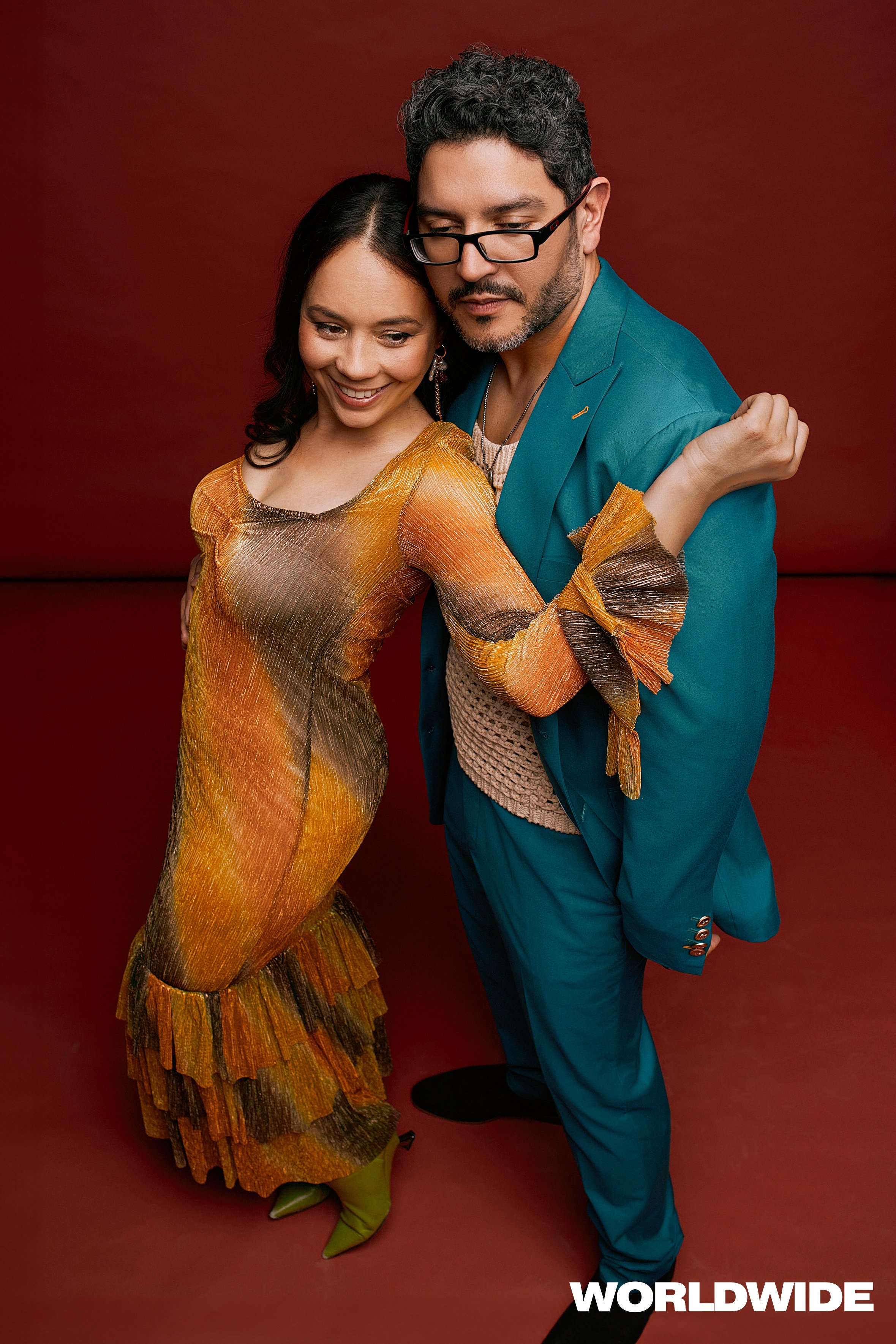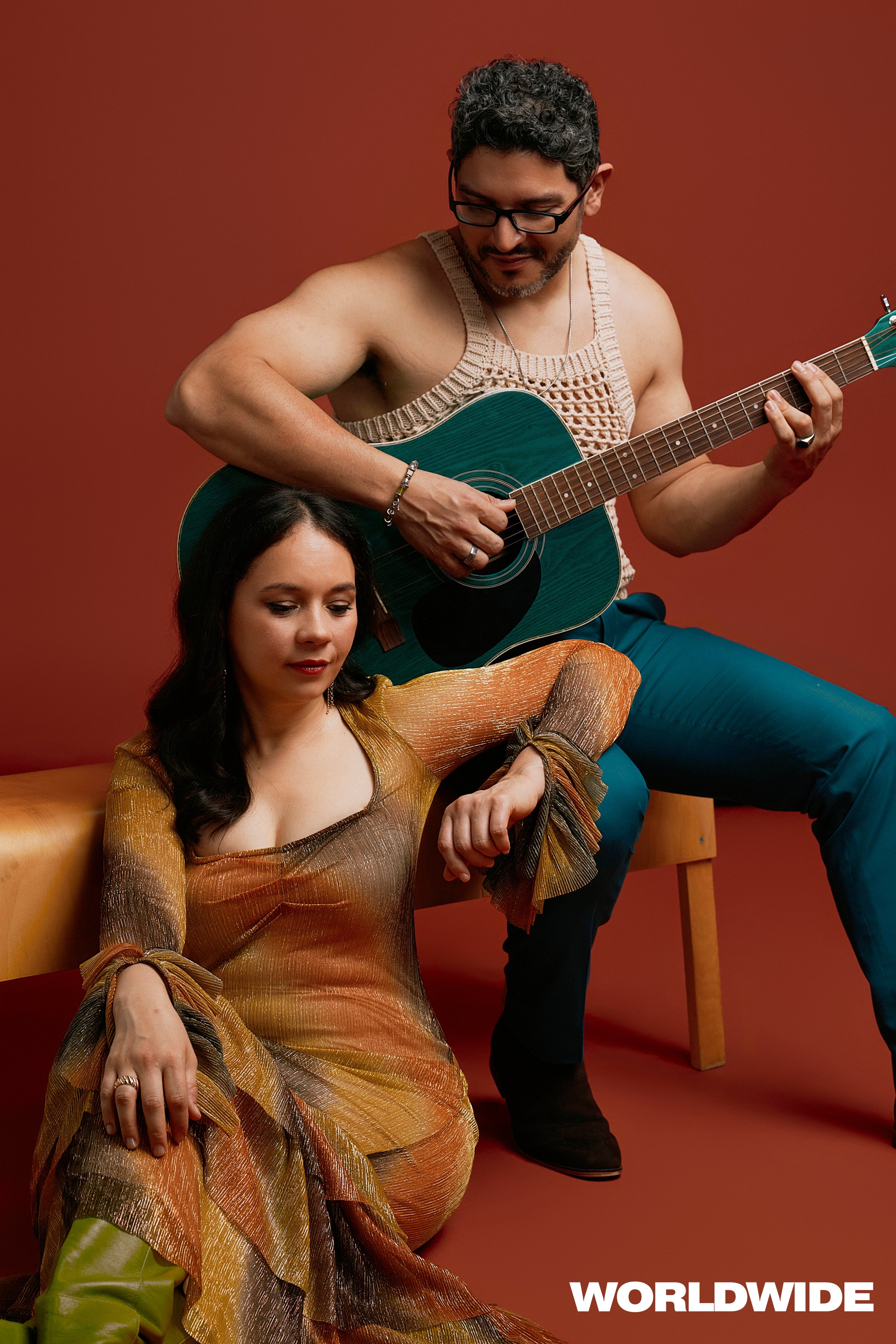WE ARE WORLDWIDE: MABI X WORLDWIDE MAGAZINE
TALENT ROSA RODRIGUEZ + FRANDY VERAS ★ INTERVIEW + STYLED BY ANDYOMO ★ PHOTOS BY MARIA PANINA ★ BEAUTY BY EVIE RY ★ STYLE ASSIST KAICY "KIKA" NARANJO
SPECIAL THANKS TO MADELINE MARIE, MIA VESPER, FANG NYC, AINO HEINIÖ, ARRE HATS, + HANNAH DAVIS JEWELRY VIA FLYING SOLO, AKOBI MEN VIA THE CONFESSIONAL SHOWROOM, BENEDETTA BOROLI VIA DOORS NYC
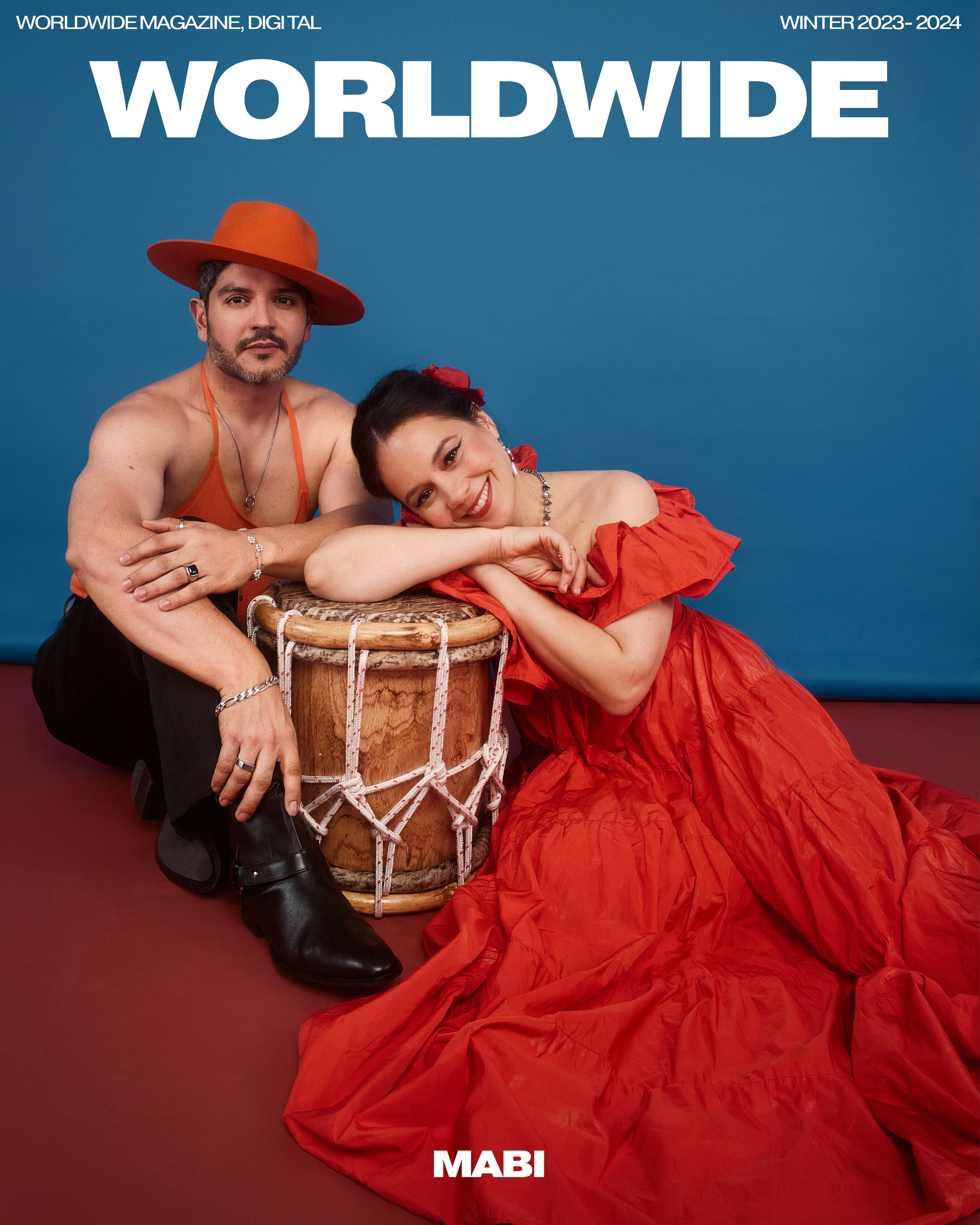
AndyOmo: Hi guys. Thank you so much for taking the time to talk to us at Worldwide. Let's go ahead and start by introducing yourselves, starting with your names and how long you've been in your industry.
Rosa: I'm Rosa and I've been doing artistic things between singing, dancing, and acting for a long time now, pretty much since I was a little girl, but in terms of music and what we're doing now, I would say we started seriously right before the pandemic, a good few years now.
Frandy: Yeah, I'm Frandi and I started a long time ago. I think I was 13 when I started getting involved in bands back in the Dominican Republic. Now I'm working with Rosa, so it's been a journey.
Amazing, and how did you two meet and get involved in music together? I know from our past conversations that you two used to be in a band together prior, correct?
R: We did. It's kind of funny because we were born and raised in the same city, Santo Domingo, Dominican Republic. We went to the same college, and we studied the same undergrad but never met there. Then we both came to the United States, separately to live and study and make a life. A friend from college put us in contact here because we were both here, and Frandy had a band with a group of guys and he invited me to sing with them.
F: The band was already formed, but because my friend told me, "I know this girl, she's such a great singer." I said, "You know what? Tell her to come." I got her phone number, called her, and she went to our basement, and as soon as she started singing, I was like, "This is it."
R: It's funny. I had a song and had lyrics and melodies in my head [that] I had for a couple of days tossing around, and then that day he started to play something that he had also been kind of playing around with. I just started to sing what I had in my head over what he had and it became the first song that we worked on together, and it was just kind of magical.
A bit of a kismet moment for sure. That's so cool, I love to hear that. A lot of the time, a big part of artists in general, and the way we perceive artists is the finished product. So it's awesome for us to hear those things about starting in a basement or starting in this kind of moment that just felt right. I think that's a big part of chemistry within the art. I wanted to know, when did you know that you wanted to get into songwriting? Have lyrics always come naturally to you Rosa? Same thing with you Frandy, within the music. Have you always had like a gift or is this something that you fell in love with at a specific time?
R: Well, I've always been very verbal, very into words. As a little kid, It's crazy, [because] I would listen to songs and I would want to learn every word of them. I would write them down, even before I spoke English, I only spoke Spanish. I would phonetically write down the words of songs in English so that I could learn them. I feel like I always had this passion, not just for storytelling, but also for the words and the sounds of the words. Even if you don't know what the lyrics are for something, just from the sounds and the pitch. It helps tell the story. I've always been into reading and songs, and then eventually also got into musical theatre. The first time that I attempted to write a song, I was, like, nine or ten. I remember it was a bit traumatic because my mom found it and started to read it out loud. She's like, what is this? I'm like, no! In college, I used to write song parodies, and that was a funny thing that I did. Then, in terms of actually writing songs, it was when we got together, and that was like one of the first songs that I had made and it just felt so natural. [Frandy] had a way to really take what I had and make it into something, and then that kind of made me do more. So it was around that time, but we were young.
F: It feels like her energy feeds into my energy because I'm really harmony and melody-driven. I can hear the chords the guitar riff and the hooks, either with bass or guitar or even the drums. I can hear in my mind what she's singing. So I put together like the whole bass so she can just, surf over it and it's been like that for as long as I can remember. By ear, I used to listen to a song and just start playing it after a while, it doesn't come from nowhere. I've been very good at getting things by ear. Then when I came to [the] United States, you know, being away from the island, plus a bad breakup, I wrote my first song. That was like, 2008, 2007. That's how, how I started writing songs. Composing songs, like the music, I've been doing it since I was a kid.
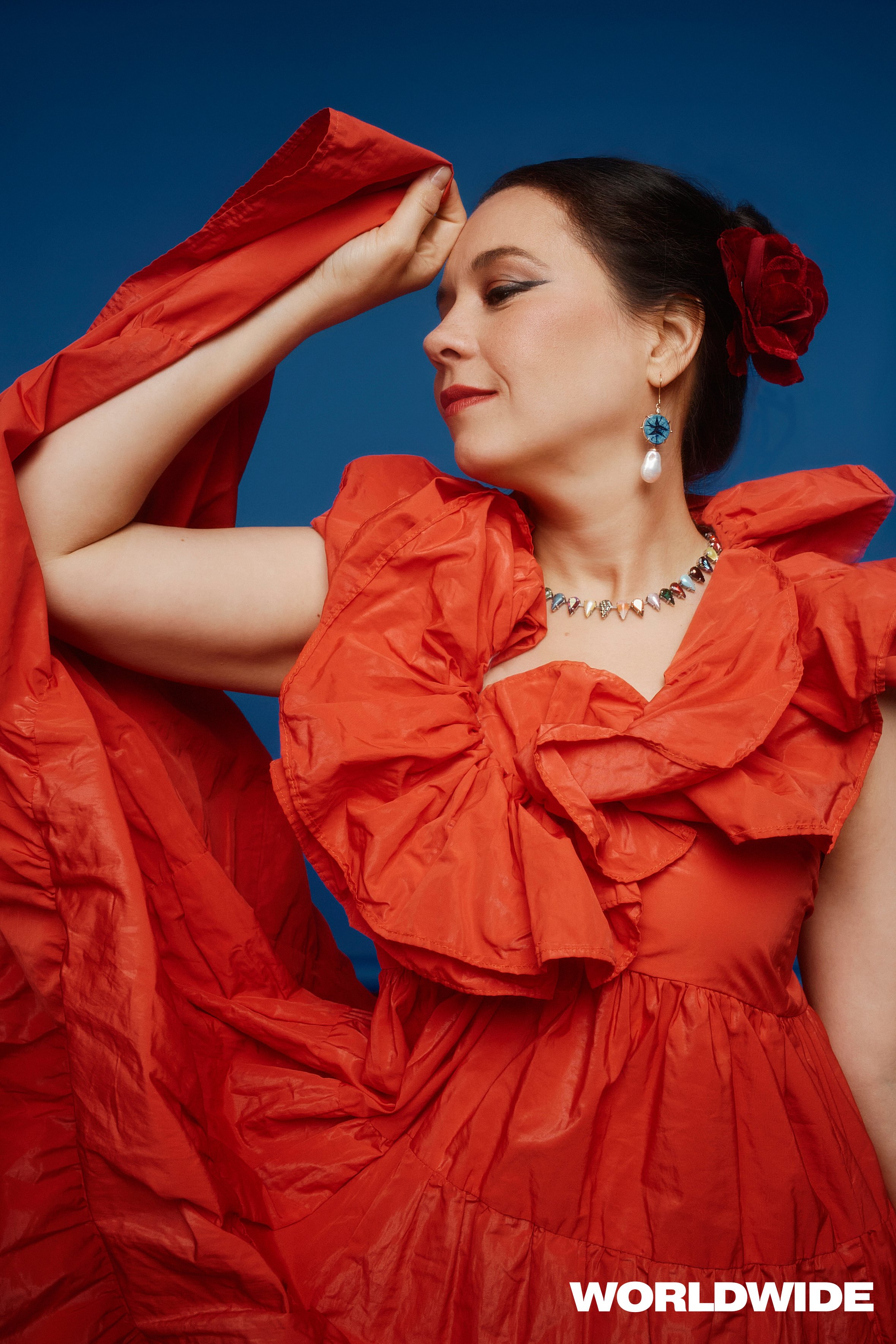
R: He's very strong at what I don't really have but need. I'm very into the music, but he's really that department. He always starts with the guitar, but then he kind of takes care of everything else. Then I'm more of all the words and the story and the melodies. That's kind of how we work well together.
Very symbiotic, the relationship, I love that. Where would you guys say that your mutual inspirations come from? I hear a little bit of you guys talking about breakups and a bit about what's going on in your life. The parodies are kind of fun to hear too, but where would you say that you guys get most of your inspiration from together?
F: So much. Life itself is an inspiration, everything we go through. We have a really deep way of looking at life, we're always analyzing and questioning everything. Lately, what we have been going through is hard to pinpoint what is it because you come from a background. For example, I have heard so much music all my life. From the merengue, salsa, bachata, everything to the rock music. Back in the Dominican Republic, I used to listen to MTV. So, there is so much influence [making it] hard to pinpoint the inspiration, per se.
R: Yeah, in terms of the music that you know, we have influences from yeah It's like a little bit of everything. We kind of grew up at a time when it was a lot. I was very into pop and later into Latin folk, and he was kind of a metalhead for a while, rock and roll in Espanol, which is kind of its own genre. Then there's the tropical stuff that we personally never really thought we were aiming for. It kind of found us It kind of like "Yes, we are a part of you and we're coming out," and then it came out.
In terms of what we talk about, I would say at this stage of our lives, we draw from our history, our upbringing, the culture, and the religion that we grew up in. How you are molded to be a certain way to have a certain kind of life, [and] to study one of these accepted careers, and then make a life that looks this way. We both, in our own ways, [have struggled] to fit into that. We feel like there are people that just completely don't fit in and there are people that really fit in. Then there are the people that fit in, who can fake it really well, but eventually figure out that this is not sustainable. Pretty much everything we write about lately, especially the songs in the album, is very much about this kind of waking up. I look at my life, to see what is in it that I need and what really serves me and make it into something that I can look forward to.
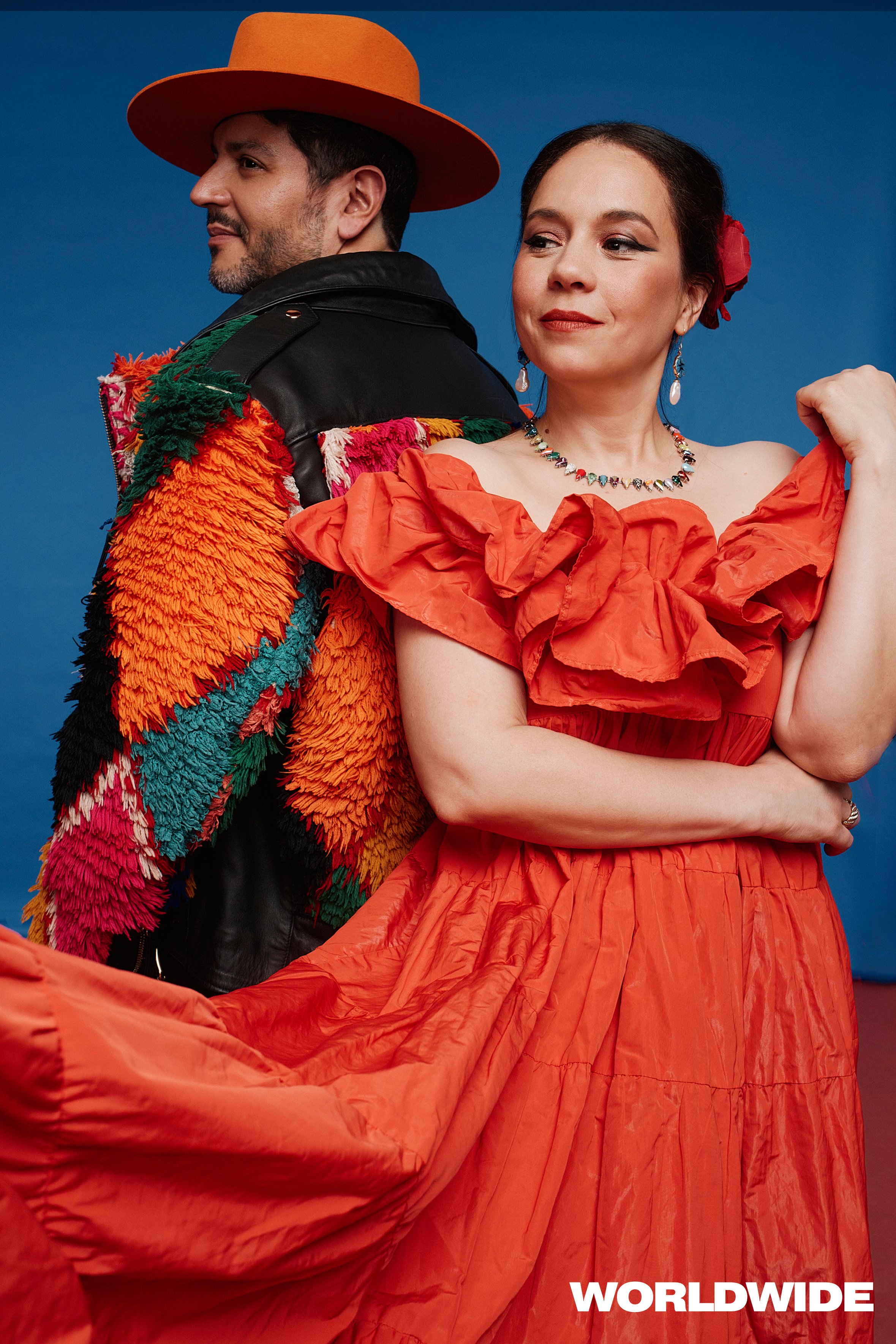
That's really awesome. You say waking up and I think almost more about this lack of complacency. My next question bouncing off of that, is do you find this pressure to conform within your music as well? Do you find making music for other people is more important in this day and age? Is there pressure with being an artist versus being authentic while sharing your stories? Does that make sense?
F: Yeah, it's always a battle.
R: Absolutely, there's definitely a big, big pressure to be successful in a certain way. To be commercially successful, to make a lot of money, to have recognition in a certain way- certain genres sell, there's a way that you have to look, there's an age that you have to be, so there's definitely a lot of pressure.
F: There is so much standardization and you can feel victimized by it. We are very inquisitive, always searching for the business part and for inspiration and to learn to do this as a career. The influencers say, you have to do this and this and this, but none of that is really about the art. The art of expressing yourself, I'd say, is [most] authentic and different [more] than anything else.
R: Yeah, I feel like you kind of have to fight for it a bit. There's a bit of everything out there. Some artists are really speaking from a place inside and some artists are just kind of copying something that sells. A lot of the time you have to find a balance of both 'cause you gotta figure out how to make a business if you want to live off of it.
I get that.
F: Now these days, with reggaeton that is so urbano and so big, the biggest right now, it's like, where do I fit in? Yeah, I'm Latino, but I don't want to do reggaeton. I might do one eventually if I feel like it, you know if it comes naturally, but I don't want to do that. So where do I fit in? I'm not a rocker, I'm not a reggaetonero, I'm not a machantero, I'm not a merenguero. And that's where we feel like we are kind of, uh, in the, in the -
R: -In the alternative.
F: Right. We have a lot of influences from folk, rock, merengue, from bachata. That's what we are. The only way we can express ourselves.
R: But definitely the tropical flavors have made their mark with us.
F: Yeah for sure. They come out like really well.
R: Our old band used to be ock in Spanish, just Rock. We were like a Spanish-speaking Paramore or something like that. We thought when we reunited, we were gonna do folk.
F: We were a little bit rock.
R: Yeah, some rock with some folk, but yeah the tropical stuff, is really natural too.
It definitely sounds like, and I'm sure this is the case for many artists out there, but it sounds like the music defines times of your life and where you're at and how you're evolving consistently too. That's what's really beautiful about art it does evolve, and it does grow with us, whether that be through shedding insecurities and allowing ourselves to kind of temper in with our core. Allowing that part of your core, of who you are and how you were raised, to always be there throughout the process. It's not that we're running away from ourselves as artists while exploring our voices, we're just running towards ourselves even deeper.
R: It's discovering ourselves. Sometimes things come out of us and they reveal themselves. Art is really a way of being in the world, it's just a way of living.
Following off of that, how would you both define success in your own words, your own success?
R: That's a lovely question. A quote by Bob Dylan that I really love says a man is successful if he wakes up in the morning and goes to bed at night, and in between he does what he wants. I feel this for life in general. I want to live the life I want and for me, the life I want is to be able to make music, make art in general, and collaborate with artists. We are really into getting into film regarding music videos. Telling my truth and making a living outta it, a comfortable living. If I am paying my bills and I don't have to worry about money, and I get to wake up and go to bed at night and in between, do what I want, mostly art, that is success.
Comfort and freedom.
R: Comfort, freedom, and expression.
How about you Frandy?
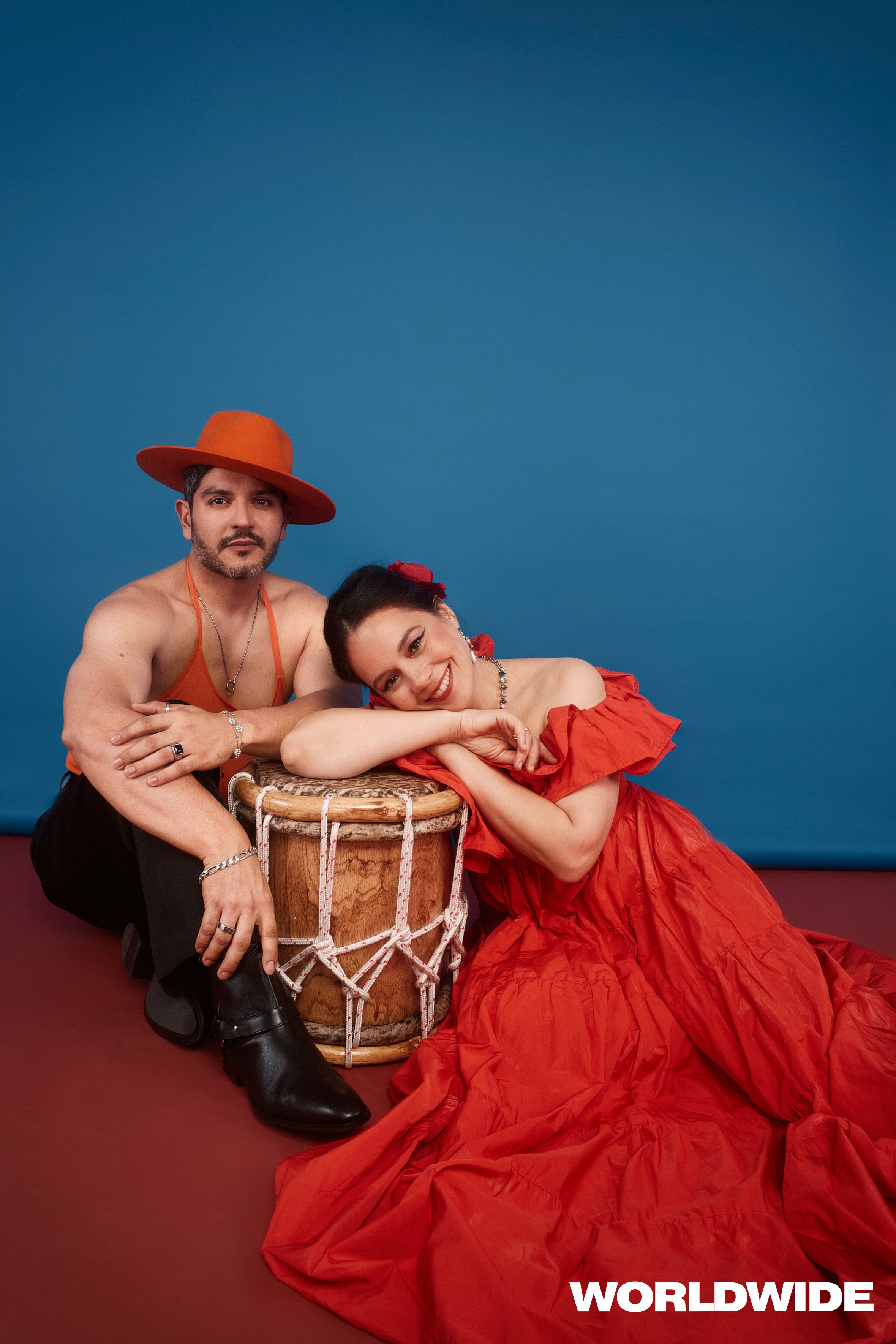
F: Being authentic, doing whatever you are supposed to do right now. We tend to live either in the past or looking forward to the future, but what about now? What can you do right now that is gonna make you feel expressed, and be in the moment without having to worry about what happened before, what's coming next? That's the big question, the challenge we have as a musician because we are channels and we get all these feelings and information, and now we're supposed to be business owners, too. It was never supposed to be like that before somebody else used to handle it.
R: Yeah, nowadays you have to be everything.
F: So, you know, that's the challenge. It doesn't have to look anyway. It just has to look the way it's looking right now. You're going to keep going, you're going to keep growing, and if you have to do this part-time, it's fine, because you're still expressing yourself. It's not like you're a failure because you don't have millions and millions of followers, no. Just be yourself, be authentic, and give your best to whatever feels good.
I completely agree. I think it's interesting living in a time too where a lot of people see their success happen in front of their eyes. I think when we look back at some of the great artists from the past, a lot of them lived very successful lives and didn't even know it yet. Having such beautiful art that maybe was ahead of its time and later came out as being a trendsetter or some of the best art we've seen in the world. It is interesting living in a world where, we as artists are, searching for a sense of instant gratification. But, that's not how art works. Art is very much so based off of allowing yourself to express how you're feeling in that moment. I think that that in itself is so temporary, that how could it be something that's an end goal. You know what I mean?
F: You can't stay there forever. You have to just flow.
R: Well, that's the thing, when you put it that way if you have a picture of what you expect, then you get there, and then what? Are you done? Do you go to sleep? You know?
Totally, I completely agree. Especially from my point of view with talking to a lot of other Latin and Latin American people, there's a lot of pressure, on this idea of the American dream and success. Not to take away any of the sacrifices of the people who came before us to help us get to where we are, but at the same time, their sacrifices were made so that we could express ourselves in a way that felt authentic and live in a place that we continue to build ourselves. It's really empowering when you guys come in here and you make your own lane. You say this isn't like the music that we're hearing is super mainstream, but this is what we're trying to say and this is where we're at. As artists, that's exactly where we're supposed to be, where we're at. The rest of the world will catch up.
R: You express your message, your story, the thing that you want to say, and it gets out there, and some people maybe are waiting to hear that. People who are feeling the same way, they connect with you, they feel seen, they connect with each other, and that's kind of the purpose, you know. We all have our audience.
F: We all vibrate in a certain frequency, with those people that are vibrating with us, and that's it. You cannot control anything else. That's all you can do.
On the same wavelength, i love it. Moving on, can you tell us a bit more about your upcoming new album, Aqui Ahora, and what we might expect from listening to it?
R: Aqui Ahora, is a collection of seven songs that we've been writing for two years. A lot of them were born out of the pandemic, and it became a sort of a concept album. It's a story beginning to end in a way, a hero's journey. The main character is a woman, and it's about her waking up to the idea that she's been living on autopilot most of her life and that she may want something else. There's this part of her that has dominated so far that is very strict and it has led her down the road that she was supposed to go, but then there's also this creative part of her that is dying to make contact. So throughout the songs, we end up seeing her make contact with this creative part of herself.

F: A journey of integration. I guess what we are looking forward for people to get out of this experience, the album and the songs, is to question yourself. Not taking things at face value. You can question everything, even the things that your parent teach you, they are not commandments. You can do everything. That's what we're hoping, that people can find more creative ways to interact with themselves.
R: Yeah, through questioning, through getting to know yourself, getting to know the people around you, and hopefully getting to a point where you can be more authentic. Yeah, it's a journey towards more authenticity and therefore, happiness and integration.
It's definitely a blossoming.
R: We're looking to start releasing a few singles early next year. It's going to be a year of releasing and promoting and hopefully getting a bit of a buzz.
That's really exciting. I know that we're excited. I've heard them myself and I'm obsessed with a few so I definitely can't wait for other people to hear and see what you guys have been working on. People, especially after COVID kind of came around. You said it earlier like we opened our eyes, and like, it opened a lot of people's eyes on the way that we can go about moving forward. We only trap ourselves and a lot of messages that I've gotten from you guys, are being a blossom of just light and growing not allowing anything around you to hold you back because it will if you let it.
R: There's this thing that we keep repeating and it's "Your limits come from inside." When you're an adult and you're living your life, there's a lot of the limitations that we set for ourselves. Of course, some of us are more privileged than others, but in general, we can take on more control of the wheel of our lives.
It's so interesting because as you grow up a lot of the things that define who you later are in life are up in the air. They float around us as we gravitate towards the ones that are intriguing to us in the moments that we find ourselves in. As you do get older, you do start to solidify this identity, and a lot of these things _are_ the things we were taught growing up, and _are_ the situations that we've been put in, and _are_ the trials and tribulations that we've been through. Life does, in a sense, make you who you are at the end, but it's not to say that that's all that you are, that's like your outer shell in a way. You know what I mean? It's how we protect ourselves, especially as artists being very vulnerable with the way that we express ourselves, there has to be some sort of protection, right? Breaking through that is the truest form of authenticity in its own way. It's hard. I think there's a lot of balance between being raw and authentic and yet inspiring people to do the same. The only way to open or change people's minds is to speak up and feel a little bit terrified of how that may come off to some people as well.
F: You know, we all want to feel safe, to experience love, but sometimes that safety is whatever that is limiting us.
R: They say outside of your comfort zone is where you grow. It's a balance. Of course, you need to be safe to a certain degree, but also you need to push yourself and be a little scared.
Right. I heard someone say running toward the next comfort zone is how you break out of that comfort zone. And that's hard, because why would you want to leave somewhere warm and cozy? But I get it, a lot of people's minds are limited to this tunnel vision idea of success or the American dream, as an end goal. A lot of people realize, halfway through that, that maybe that wasn't the end. Maybe, I have all this to live, and it's exciting to see people completely change their entire point of view of what their limits are and how to expand them. So I love that.
Moving forward a little bit, getting closer to the end. As a POC artist in general, do you find that doors have opened for you easily? Or would you say, opportunities are fewer and more difficult to land as a POC artist?
F: I think right now, especially in our community with Spanish-speaking artists, there is a booming of people singing in Spanish, in their native language, hitting charts, top charts, everywhere in the world. It's exciting. It's very, it's crazy to think about it. I just saw an article on Forbes where they are declaring Bad Bunny, the new king of pop and there is so much controversy about it, but I'm like, you know what? It is beautiful.
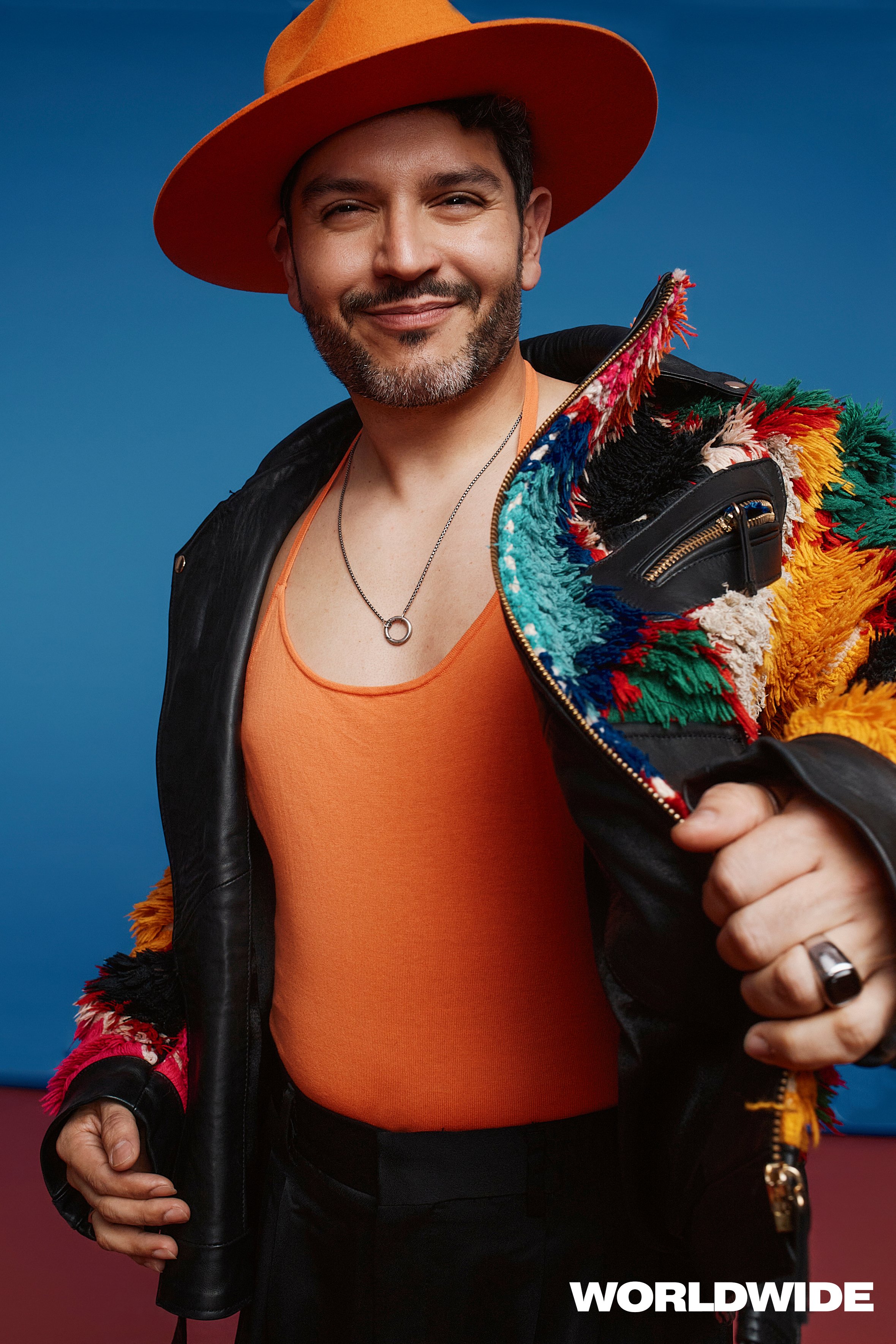
R: It's beautiful, yeah. You see this, multi-dimensional artist that is Puerto Rican, Spanish speaking, and so it's it looks hopeful. That said, there's still a lot to do, especially for tiny, artists just beginning. There are challenges.
F: I think we need more, more organization. I'm pretty sure there are many but, I would love to see more organizations that can create spaces where everybody can share different experiences, kind of like a union.
R: With information, resources, and contacts. Yeah,
F: Different artists, sharing ideas, and sharing musicians, and sharing producers, and engineers, and all this all in the same place. Then you create this community where everybody's growing together, and people are helping out each other.
R: So basically, there's not a lot that is very readily available. There's a spirit of competition and it would be good if we learned to be more collaborative and together in this. We are professionally starting to get out there so we'll see how it goes. It's been hard so far to find venues to play that are like kind of our vibe for our kind of music
F: There are a few, but there could be more. We want to be in New York, but it's a challenge. But again, the passion is great, and we are very proud of what we accomplished with the album and are ready to share it. did.
R: Yeah, and we're looking forward to having fun with the challenges, figuring it out. We're trying to face it like we're playing a video game on hard mode and we're just gonna figure it out and we'll see. We'll see and if we go far, then it's important to us to start helping and making way for other people to come after us.
F: It's like what you're doing for us, we're very grateful for the opportunity for it.
I think that what you say is very true in the sense of a community and at the end of the day that's what Worldwide intends to do. To be able to be a platform where people can connect with inspirational stories such as your guys and hear how individual each story is, I think that's really important for people to hear. Again, like I said earlier, I think we, especially people who aren't necessarily artists, tend as a society to see the end product and I'm focused on everything before that. You know, the end product is such a colorful page in our book of life, but it's not the whole book.
Especially as myself, being a POC and being queer, I do think that a lot of people, including myself, can tend to feel, alone in our industries, but there's a sense of comfort and knowing that we're all feeling that way at the same time. It's about branching outside of our comfort zones to be able to then lift people up and provide resources that we can while being able to create spaces for each other. It's exciting to be able to meet so many people from all walks of life who are experiencing a lot of what I so often hear as common. People are inspired by these stories, even if it's just one or two people's lives that we touch in the entire world, through one person's creative journey. I always say if we can touch one person that's the goal. Because at the end of the day, growing up there wasn't a lot for us to be able to look out at and see these people like us that were doing it and were killing it. It is inspiring to see that there are a lot of people doing it, but I don't think that that means stepping on each other to do it. I think a lot of people will be inspired to hear your story.
One more question that I have is what creative outlets do you guys have just for you outside of music?
F: Actually cooking is my passion, I really love that. And I'm into doing weights and taking care of my body I never did that before.
R: Yeah, and nutrition too.
F: Yeah, nutrition and fasting and weights and all that. It's been quite a journey and I'm feeling it. I have a group of people, a small community through WhatsApp, and there have been a lot of good results so far. I love movies too.
R: I also love cooking. We have very different styles. He's like a chef in a restaurant, like making everything and I'm like a mama style. I'm gonna feed you and you're gonna feel like your heart is warm. Oh, also I love dancing. We both love dancing. Salsa and merengue-
You're so good at it.
R: Love love love dancing and reading, drawing, I like a lot of things
I love it. I think artists, especially in this day and age when we're making businesses out of it, it's important to remember to do things for us. To have those moments that don't have to have that pressure that we put on ourselves. To just have fun.
R: They say once your art becomes your job then it becomes a job. Trying to keep it alive and to keep yourself alive in other areas.
Overall it's a process and the word of the day, is balance, it's truly a journey. That's what were here to shine light on. Thanks so much for speaking with me guys, your story is truly inspiring and I can't wait for our readers to hear it and see the amazing photos we came up with. And I'm so excited for the album and every single to come out this year. We're excited to cover it and to see all the visuals that come with that too. Thank you guys!
R: Awesome, thank you!
F: Thank you!
